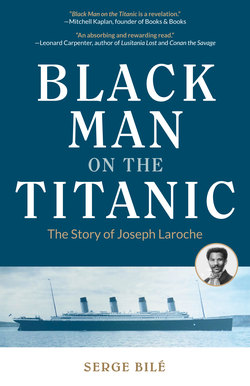Читать книгу Black Man on the Titanic - Serge Bile - Страница 6
На сайте Литреса книга снята с продажи.
ОглавлениеPreface
The sinking of the Titanic in April 1912 generated within a century a multitude of books, films, and video games. Each of these honed in on the drama of the accident in all its forms, focusing mostly on the personality and the psychology of many of the passengers. But the tragic story of Joseph Philippe Lemercier Laroche has been largely excluded from history.
At a time of heightened racial imbalance and hostility, a Black man from Haiti boarded the RMS Titanic—not as a crew member, but as a paying passenger: one of the few Black passengers on board the famous ship. Raised in a world of stultifying expectations about race, Joseph Laroche was educated in France, where he found professional successes and contributed to the construction of the Parisian railway. What do we know about Laroche, a direct relative of Jean-Jacques Dessalines, the first ruler of independent Haiti? How was his childhood in Cap-Haïtien, and how did he come to travel to Beauvais, Lille, and Paris? Why did he give up first-class tickets for the luxury ship La France to board the Titanic with his wife and two daughters? Where was he going—and why?
That is the story I tell: the true story of one black man whose triumphs were shadowed by prejudice, social expectations, and tragedy, but also the remarkable story of a time period. As I delve into black history and the singular bonds between the United States and the Antilles, this is definitely not “just another book about the Titanic.” While The Black Man on the Titanic covers the tragedy, offering a new approach to a slice of history that still fascinates millions, it also presents little-known aspects of the African American and Caribbean experience.
In order to properly honor Joseph Laroche’s story, I used a narrative style throughout much of this book, combining source material from letters, interviews, newspapers, and archives to create a more engaging narrative.
Because I relied on testimonials and secondary sources and, as we all know, human memory is deeply flawed, some events have been compressed and some conversations and inner dialogue have been recreated in varying degrees. I retold them in a way that evokes the feeling and meaning of what was said and, in all instances, the essence of the dialogue (both internal and external) is accurate. Any mistakes are mine.
I would like to thank the descendants of the family portrayed in this book for the privilege of interviewing them, particularly Christina Schutt, the great-grandniece of Joseph Laroche, who not only provided letters and other written materials, but also shared her family’s oral history.
Thank you to Georges Michel, Christian Boutillier, and Bruno Rousseau. All the interviewees are good, hard-working people who helped with my research immensely. Christian Boutillier shared with me a file that documented everyday life at École du Saint-Esprit in Beauvais, which allowed me to recreate the time Joseph Laroche spent at the school, although nothing in the file directly referred to Laroche himself. Bruno Rousseau, who attended the same Jesuit school I did, forty years ago in France, helped me remember the details of boarding school life: the masses, the studies, the games… Our conversations revived my own memories and helped me walk in Joseph Laroche’s shoes.
I was given access to a variety of written sources thanks to François Codet of the French Titanic Society, Father Roger Tabard of the Congregation of the Holy Spirit, and Myriam Sylvain, who generously introduced me to Gaétan Mentor from the Haitian Historical Society.
The French Titanic Society gave me access to its archives, where I found various newspaper articles from France and Canada focused on the tragedy experienced by the family of Joseph Laroche.
Father Roger Tabard allowed me to consult the archives of Congrégation du Saint-Esprit and gather the information needed to write about the functioning of the school attended by Joseph Laroche: the roles of the priests, of the administration, of the teachers. I didn’t find much about Joseph Laroche himself, besides the eulogy I mention in the book, but the wealth of information allowed for a more detailed account.
While writing The Black Man on the Titanic, I have occasionally added my personal spin to the story, mostly to fill in gaps as best I could, but I have done my best to make it a truthful story.
Serge Bilé
